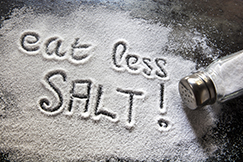NCD Watch
Be Salt Aware
29 Jun 2018 (Fri)
 Dietary salt (sodium) intake is closely related to health. As a mineral and also an electrolyte, sodium is essential for the regulation of the body’s overall fluid balance, transmission of nerve impulses and maintenance of normal cell functions. While the body generally only needs a small amount of sodium for proper functioning, consuming too much sodium is detrimental to health. For example, excess salt intake raises blood pressure, which is an established risk factor for cardiovascular diseases (including heart diseases and stroke).
Dietary salt (sodium) intake is closely related to health. As a mineral and also an electrolyte, sodium is essential for the regulation of the body’s overall fluid balance, transmission of nerve impulses and maintenance of normal cell functions. While the body generally only needs a small amount of sodium for proper functioning, consuming too much sodium is detrimental to health. For example, excess salt intake raises blood pressure, which is an established risk factor for cardiovascular diseases (including heart diseases and stroke).
As the World Health Organization (WHO) recommends, healthy adults should consume below 2 g/day of sodium, or below 5 g/day of salt (which is composed of approximately 40% sodium and 60% chloride by weight). Children should consume less sodium than adults. The younger the children, the smaller amount of sodium they require per day.
However, most people are unaware of the WHO’s recommendations and very often consume salt excessively, especially from processed foods. In Hong Kong, the Population Health Survey 2014/15, which assessed dietary salt intake by measuring sodium excretion from 24-hour urine collection, estimated that the average salt intake among persons aged 15–84 was 8.8 g/day. Overall, 86.3% (91% for males; 82% for females) of persons had dietary salt intake above the WHO recommended daily limit of less than 5 g/day.
Among children, a study used the 24-hour dietary recall method to assess the diet quality and eating behaviour of 302 preschool children aged 30–60 months in 2012/13 reported a mean sodium intake of 1.87 g/day, which was significantly higher than the recommended limit of 1.5 g/day (for children aged 2.5-3 years) from the U.S. Institute of Medicine.
The Hong Kong SAR Government has been promoting healthy diet all along, which is fundamental to reducing the salt intake of our population. In May 2018, the Government launched “Towards 2025: Strategy and Action Plan to Prevent and Control Non-communicable Diseases in Hong Kong” with a list of committed actions and clear targets, including Target 4 that Hong Kong will pursue to achieve a 30% relative reduction in mean population daily intake of salt/sodium by 2025.
As individuals, we could proactively cut back on our own salt intake and that of our families by observing the ‘5 Ways to 5 Grams’—
- Get fresh. Use fresh products wherever possible. Limit consumption of salt-preserved foods, such as processed meat, salted egg or fish, pickled vegetables, or canned food.
- Substitute salt with healthier alternatives. Use herbs, spices (such as garlic and pepper), lemon juice or vinegar in place of salt and condiments to flavour food.
- Add less salt to food. Cut down the amount of salt and sauces used in cooking. Take salt and other condiments off the table so younger family members would not develop the habit of adding salt.
- Check food labels when shopping for prepackaged foods and choose less salty options .
- Choose low salt menu items when dinning out. Check EatSmart restaurants for ‘3 Less’ dishes.






































